模块2 unit 3 grammer and usage
文档属性
| 名称 | 模块2 unit 3 grammer and usage |

|
|
| 格式 | rar | ||
| 文件大小 | 809.8KB | ||
| 资源类型 | 教案 | ||
| 版本资源 | 牛津译林版 | ||
| 科目 | 英语 | ||
| 更新时间 | 2011-05-01 00:00:00 | ||
图片预览

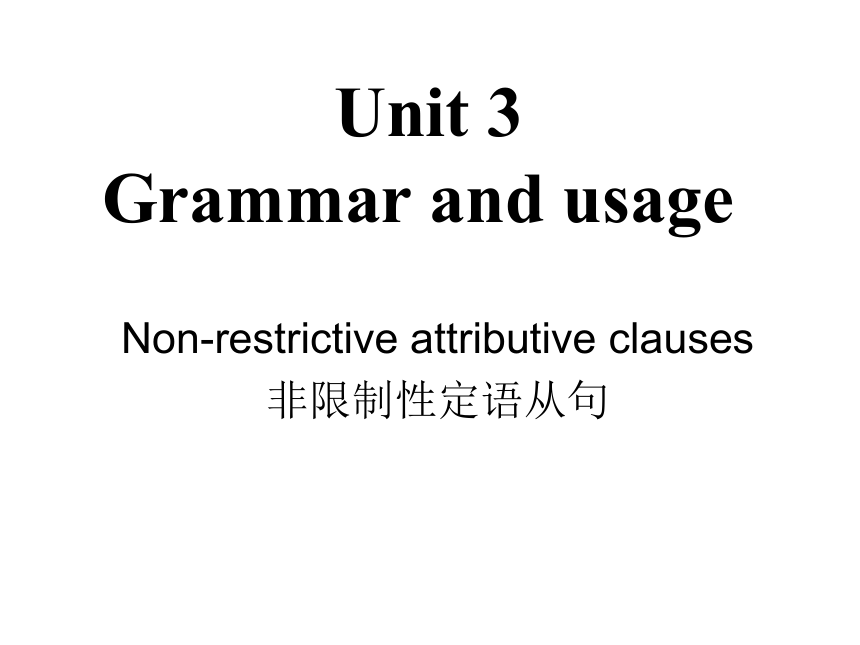
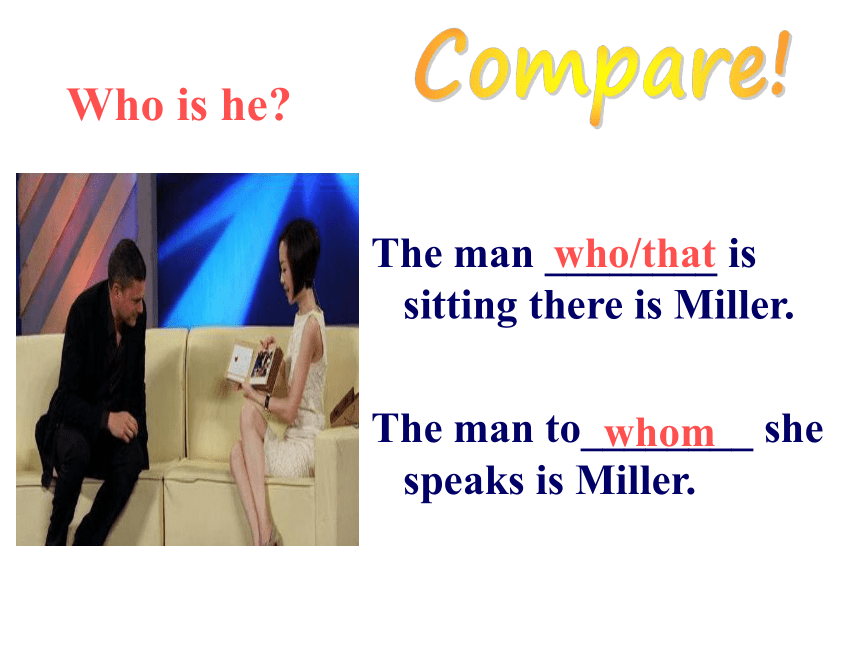
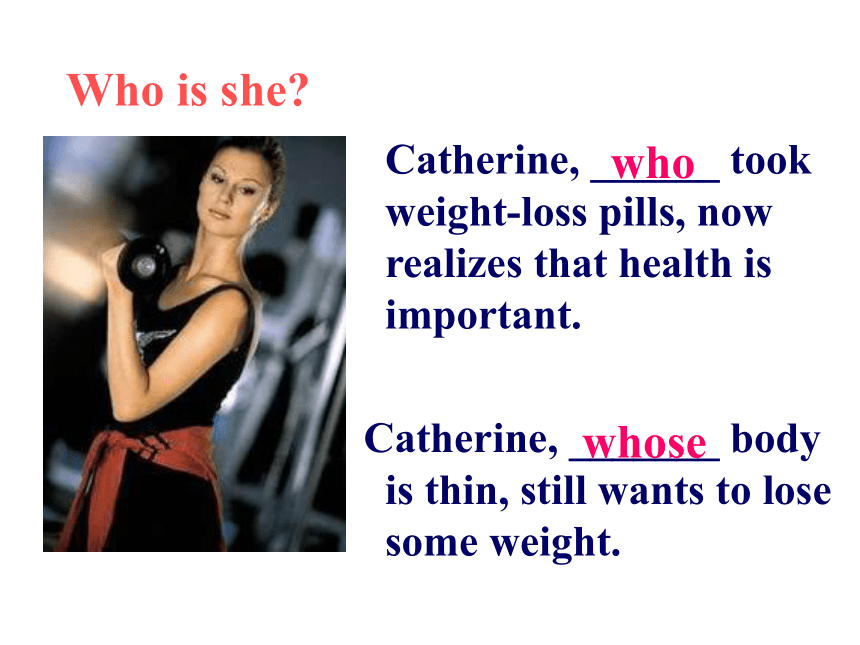
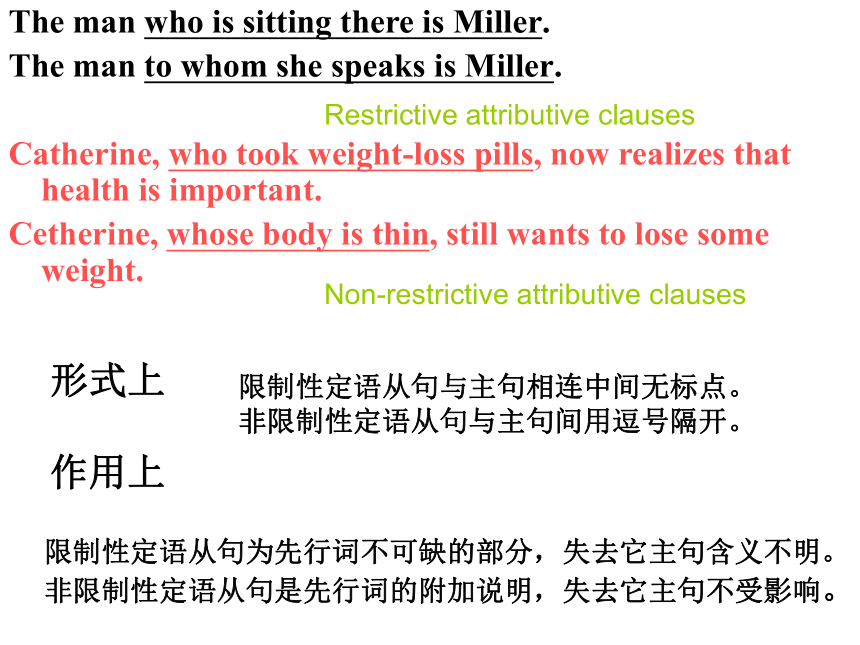
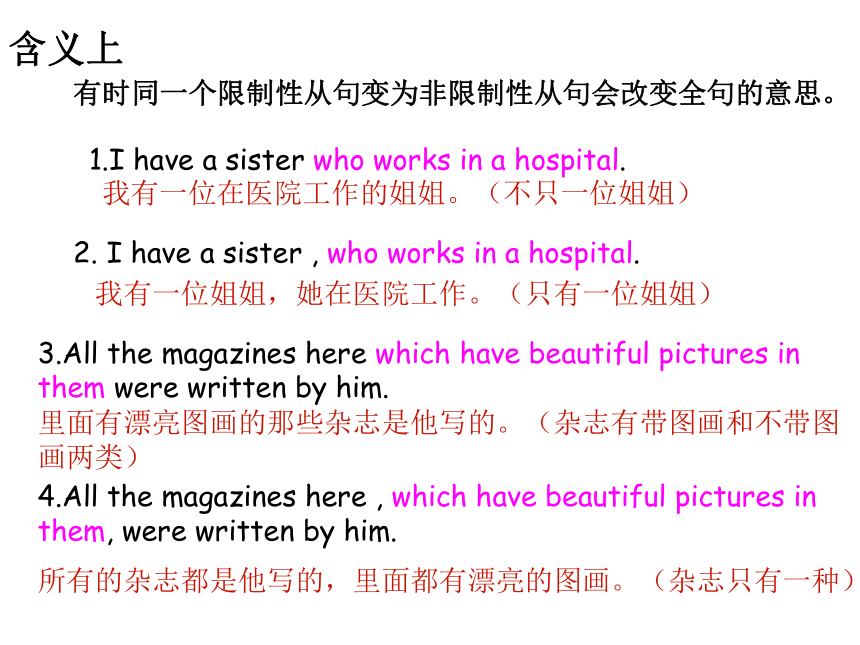
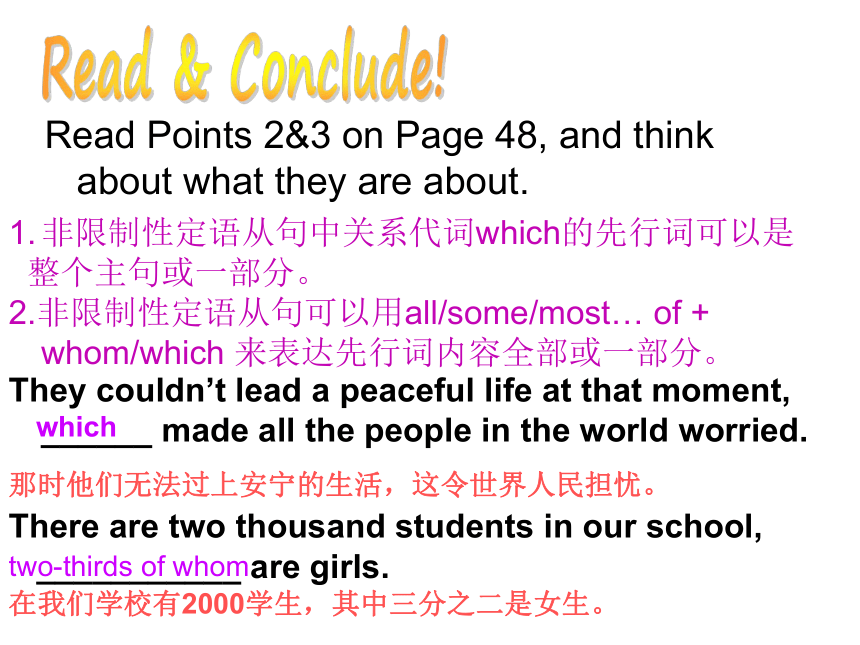
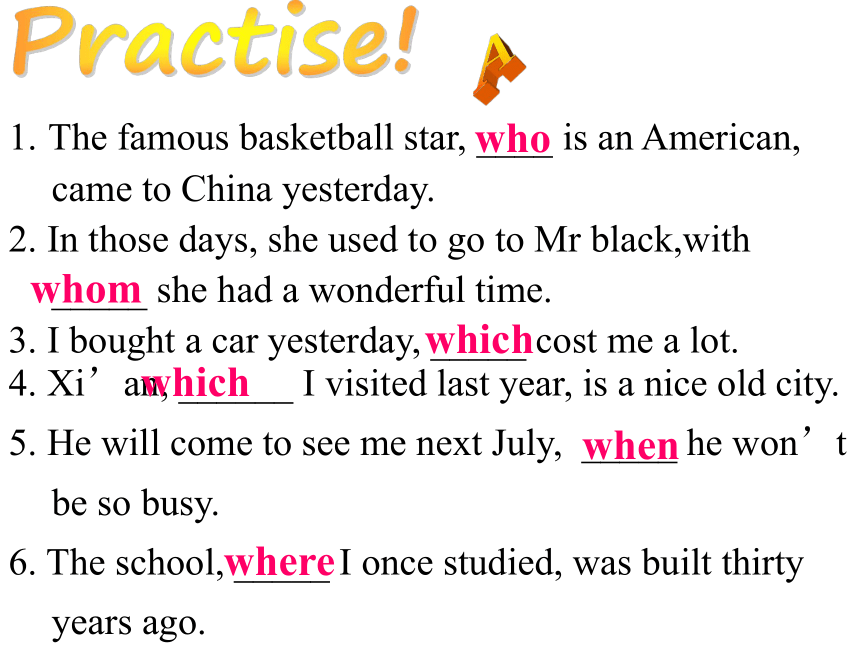
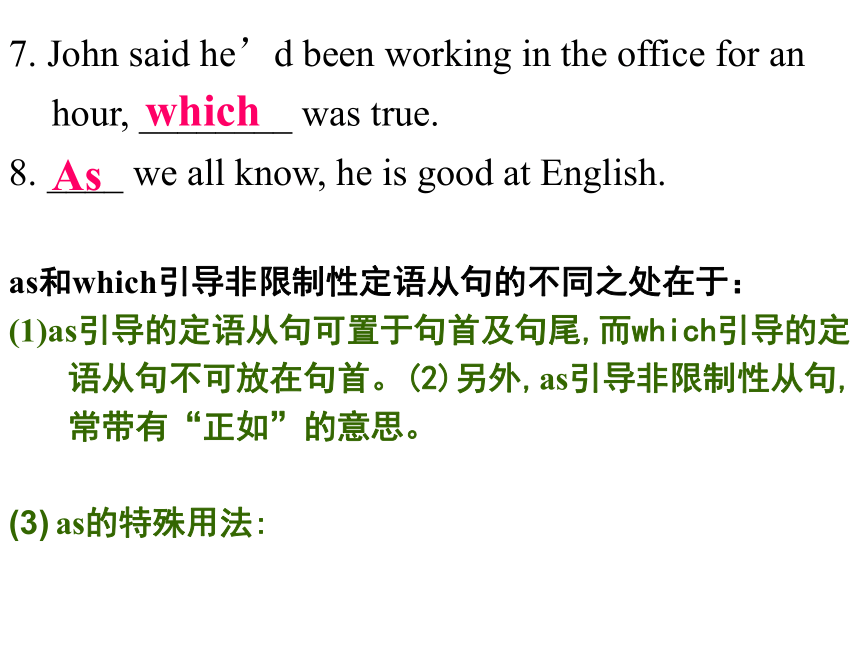
文档简介
(共23张PPT)
Unit 3
Grammar and usage
Non-restrictive attributive clauses
非限制性定语从句
The man ________ is sitting there is Miller.
The man to________ she speaks is Miller.
who/that
Who is he
whom
Who is she
Catherine, ______ took weight-loss pills, now realizes that health is important.
Catherine, _______ body is thin, still wants to lose some weight.
who
whose
The man who is sitting there is Miller.
The man to whom she speaks is Miller.
Catherine, who took weight-loss pills, now realizes that health is important.
Cetherine, whose body is thin, still wants to lose some weight.
形式上
作用上
Restrictive attributive clauses
Non-restrictive attributive clauses
限制性定语从句与主句相连中间无标点。
非限制性定语从句与主句间用逗号隔开。
限制性定语从句为先行词不可缺的部分,失去它主句含义不明。
非限制性定语从句是先行词的附加说明,失去它主句不受影响。
含义上
有时同一个限制性从句变为非限制性从句会改变全句的意思。
1.I have a sister who works in a hospital.
我有一位在医院工作的姐姐。(不只一位姐姐)
2. I have a sister , who works in a hospital.
我有一位姐姐,她在医院工作。(只有一位姐姐)
3.All the magazines here which have beautiful pictures in them were written by him.
里面有漂亮图画的那些杂志是他写的。(杂志有带图画和不带图画两类)
4.All the magazines here , which have beautiful pictures in them, were written by him.
所有的杂志都是他写的,里面都有漂亮的图画。(杂志只有一种)
Read Points 2&3 on Page 48, and think about what they are about.
非限制性定语从句中关系代词which的先行词可以是
整个主句或一部分。
2.非限制性定语从句可以用all/some/most… of + whom/which 来表达先行词内容全部或一部分。
They couldn’t lead a peaceful life at that moment, ______ made all the people in the world worried.
那时他们无法过上安宁的生活,这令世界人民担忧。
There are two thousand students in our school,
___________ are girls.
在我们学校有2000学生,其中三分之二是女生。
which
two-thirds of whom
1. The famous basketball star, ____ is an American, came to China yesterday.
2. In those days, she used to go to Mr black,with _____ she had a wonderful time.
3. I bought a car yesterday, _____ cost me a lot.
which
whom
who
4. Xi’an, ______ I visited last year, is a nice old city.
5. He will come to see me next July, _____ he won’t be so busy.
6. The school, _____ I once studied, was built thirty years ago.
which
where
when
7. John said he’d been working in the office for an hour, ________ was true.
8. ____ we all know, he is good at English.
As
which
as和which引导非限制性定语从句的不同之处在于:
(1)as引导的定语从句可置于句首及句尾,而which引导的定语从句不可放在句首。(2)另外,as引导非限制性从句,常带有“正如”的意思。
(3) as的特殊用法:
1. This is not such a book as I expected.
2. I live in the same building as he (lives in).
3. Here is so big a stone as no man can lift.
> 在限制性定语从句中,当先行词之前出现as, the same, so, such等修饰词时,定语从句一般只能用as来引导。
Let’s finish the exercises on Pages 48-49.
Workbook C1 on Page 104.
KaoYiBen P80-P82 Exercises about attributive clauses.
Grammar and usage
Question tags
反意疑问句
Question tags
Short questions that come at the end of statements. They are commonly used in spoken English.
A: The car hasn’t been cleaned for a few days, has it
B: No, it hasn’t. It’s very dirty.
A: Someone ought to clean it today, oughtn’t they
B: Mark has to clean it, doesn’t he It must be his turn, isn’t it
A: No, he cleaned it last time. It’s your turn.
Read the dialogue with the correct intonation.
He doesn’t lie ice cream, does he
We can still be friends, can’t we
Looking good is important to women, isn’t it
Rules! What can you find out in them
a. 在肯定陈述句后,疑问句用否定疑问形式;在否定陈述句后,疑问句为肯定形式。
b. 在疑问句中,要用相应的人称代词代替陈述句中的主语。
c. 疑问句中的谓语动词用助动词,情态动词或be动
词,其形式要与人称代词一致。
-- His father can’t name the plant, can he
-- Yes, he can./ -- No, he can’t.
(不,他可以。) (是的,他不能。)
回答反意疑问句一般用yes或no。yes和no的
确定是根据答语本身是肯定还是否定确定的,
和问句的肯否定形式没有关系。
注意: 英语和汉语表达上的不同
Neither of you will have coffee, will you
No one has found my CD, have they
Nobody understood his speech, did they
His sister seldom argues with people, does she
在陈述句中用了表示否定意思的neither, none,
nobody, nothing, few, little, never, hardly
和seldom等词后,疑问句用肯定形式。
陈述部分主语是不定代词everybody, anyone,
somebody, nobody, no one, everyone等,
疑问部分主语常用复数they。
Don't be late next time, will you
Write to me soon, will you
Let's start with the song, shall we
Let us help you, will you
在祈使句后的反义疑问句句中,一般用will you 结尾。
但在Let’s 开头的祈使句后,一般用shall we结尾。
He said he wanted to visit Beijing, didn't he
I don't think he is clever, is he
We believe she can do it better, can't she
陈述部分为带宾语从句的主从复合句时,
疑问部分的主语和谓语一般和主句保持一致。
但如果陈述部分是I (don’t ) think/suppose/believe
/imagine/expect/feel/guess/suspect(主语还可以
是we)等时,疑问部分的主语和谓语却要和宾语
从句保持一致,而且包括否定转移。
You must go now, needn’t you
You mustn’t smoke here, must you
You must be hungry now, aren’t you
当陈述部分有must时,若must作“必须”讲时,
其反意疑问部分用needn’t; 当含有mustn’t
(不允许,禁止)时,其反意疑问部分用must;
当must表示推测,作“一定,准是” 讲时,
反意疑问部分的动词形式根据must后边的
动词形式确定。
You must have watched that football match last night, didn’t you
Bob must have gone to bed, hasn’t he
陈述部分的谓语是“ must+ have done”,
表对过去情况的猜测时,疑问句中需用did
(有明确的时间状语)
或have/ has(无明确的过去时间状语或有
与现在相关的时间状语)。
Practice!
1.…don’t you
2.…isn’t he
3.…does he
4.…doesn’t she
5.…aren’t they
6.…can you
7.…haven’t they
8.…can’t you
Workbook C2 on Page 104.
KaoYiBen P80-P82.
Unit 3
Grammar and usage
Non-restrictive attributive clauses
非限制性定语从句
The man ________ is sitting there is Miller.
The man to________ she speaks is Miller.
who/that
Who is he
whom
Who is she
Catherine, ______ took weight-loss pills, now realizes that health is important.
Catherine, _______ body is thin, still wants to lose some weight.
who
whose
The man who is sitting there is Miller.
The man to whom she speaks is Miller.
Catherine, who took weight-loss pills, now realizes that health is important.
Cetherine, whose body is thin, still wants to lose some weight.
形式上
作用上
Restrictive attributive clauses
Non-restrictive attributive clauses
限制性定语从句与主句相连中间无标点。
非限制性定语从句与主句间用逗号隔开。
限制性定语从句为先行词不可缺的部分,失去它主句含义不明。
非限制性定语从句是先行词的附加说明,失去它主句不受影响。
含义上
有时同一个限制性从句变为非限制性从句会改变全句的意思。
1.I have a sister who works in a hospital.
我有一位在医院工作的姐姐。(不只一位姐姐)
2. I have a sister , who works in a hospital.
我有一位姐姐,她在医院工作。(只有一位姐姐)
3.All the magazines here which have beautiful pictures in them were written by him.
里面有漂亮图画的那些杂志是他写的。(杂志有带图画和不带图画两类)
4.All the magazines here , which have beautiful pictures in them, were written by him.
所有的杂志都是他写的,里面都有漂亮的图画。(杂志只有一种)
Read Points 2&3 on Page 48, and think about what they are about.
非限制性定语从句中关系代词which的先行词可以是
整个主句或一部分。
2.非限制性定语从句可以用all/some/most… of + whom/which 来表达先行词内容全部或一部分。
They couldn’t lead a peaceful life at that moment, ______ made all the people in the world worried.
那时他们无法过上安宁的生活,这令世界人民担忧。
There are two thousand students in our school,
___________ are girls.
在我们学校有2000学生,其中三分之二是女生。
which
two-thirds of whom
1. The famous basketball star, ____ is an American, came to China yesterday.
2. In those days, she used to go to Mr black,with _____ she had a wonderful time.
3. I bought a car yesterday, _____ cost me a lot.
which
whom
who
4. Xi’an, ______ I visited last year, is a nice old city.
5. He will come to see me next July, _____ he won’t be so busy.
6. The school, _____ I once studied, was built thirty years ago.
which
where
when
7. John said he’d been working in the office for an hour, ________ was true.
8. ____ we all know, he is good at English.
As
which
as和which引导非限制性定语从句的不同之处在于:
(1)as引导的定语从句可置于句首及句尾,而which引导的定语从句不可放在句首。(2)另外,as引导非限制性从句,常带有“正如”的意思。
(3) as的特殊用法:
1. This is not such a book as I expected.
2. I live in the same building as he (lives in).
3. Here is so big a stone as no man can lift.
> 在限制性定语从句中,当先行词之前出现as, the same, so, such等修饰词时,定语从句一般只能用as来引导。
Let’s finish the exercises on Pages 48-49.
Workbook C1 on Page 104.
KaoYiBen P80-P82 Exercises about attributive clauses.
Grammar and usage
Question tags
反意疑问句
Question tags
Short questions that come at the end of statements. They are commonly used in spoken English.
A: The car hasn’t been cleaned for a few days, has it
B: No, it hasn’t. It’s very dirty.
A: Someone ought to clean it today, oughtn’t they
B: Mark has to clean it, doesn’t he It must be his turn, isn’t it
A: No, he cleaned it last time. It’s your turn.
Read the dialogue with the correct intonation.
He doesn’t lie ice cream, does he
We can still be friends, can’t we
Looking good is important to women, isn’t it
Rules! What can you find out in them
a. 在肯定陈述句后,疑问句用否定疑问形式;在否定陈述句后,疑问句为肯定形式。
b. 在疑问句中,要用相应的人称代词代替陈述句中的主语。
c. 疑问句中的谓语动词用助动词,情态动词或be动
词,其形式要与人称代词一致。
-- His father can’t name the plant, can he
-- Yes, he can./ -- No, he can’t.
(不,他可以。) (是的,他不能。)
回答反意疑问句一般用yes或no。yes和no的
确定是根据答语本身是肯定还是否定确定的,
和问句的肯否定形式没有关系。
注意: 英语和汉语表达上的不同
Neither of you will have coffee, will you
No one has found my CD, have they
Nobody understood his speech, did they
His sister seldom argues with people, does she
在陈述句中用了表示否定意思的neither, none,
nobody, nothing, few, little, never, hardly
和seldom等词后,疑问句用肯定形式。
陈述部分主语是不定代词everybody, anyone,
somebody, nobody, no one, everyone等,
疑问部分主语常用复数they。
Don't be late next time, will you
Write to me soon, will you
Let's start with the song, shall we
Let us help you, will you
在祈使句后的反义疑问句句中,一般用will you 结尾。
但在Let’s 开头的祈使句后,一般用shall we结尾。
He said he wanted to visit Beijing, didn't he
I don't think he is clever, is he
We believe she can do it better, can't she
陈述部分为带宾语从句的主从复合句时,
疑问部分的主语和谓语一般和主句保持一致。
但如果陈述部分是I (don’t ) think/suppose/believe
/imagine/expect/feel/guess/suspect(主语还可以
是we)等时,疑问部分的主语和谓语却要和宾语
从句保持一致,而且包括否定转移。
You must go now, needn’t you
You mustn’t smoke here, must you
You must be hungry now, aren’t you
当陈述部分有must时,若must作“必须”讲时,
其反意疑问部分用needn’t; 当含有mustn’t
(不允许,禁止)时,其反意疑问部分用must;
当must表示推测,作“一定,准是” 讲时,
反意疑问部分的动词形式根据must后边的
动词形式确定。
You must have watched that football match last night, didn’t you
Bob must have gone to bed, hasn’t he
陈述部分的谓语是“ must+ have done”,
表对过去情况的猜测时,疑问句中需用did
(有明确的时间状语)
或have/ has(无明确的过去时间状语或有
与现在相关的时间状语)。
Practice!
1.…don’t you
2.…isn’t he
3.…does he
4.…doesn’t she
5.…aren’t they
6.…can you
7.…haven’t they
8.…can’t you
Workbook C2 on Page 104.
KaoYiBen P80-P82.
